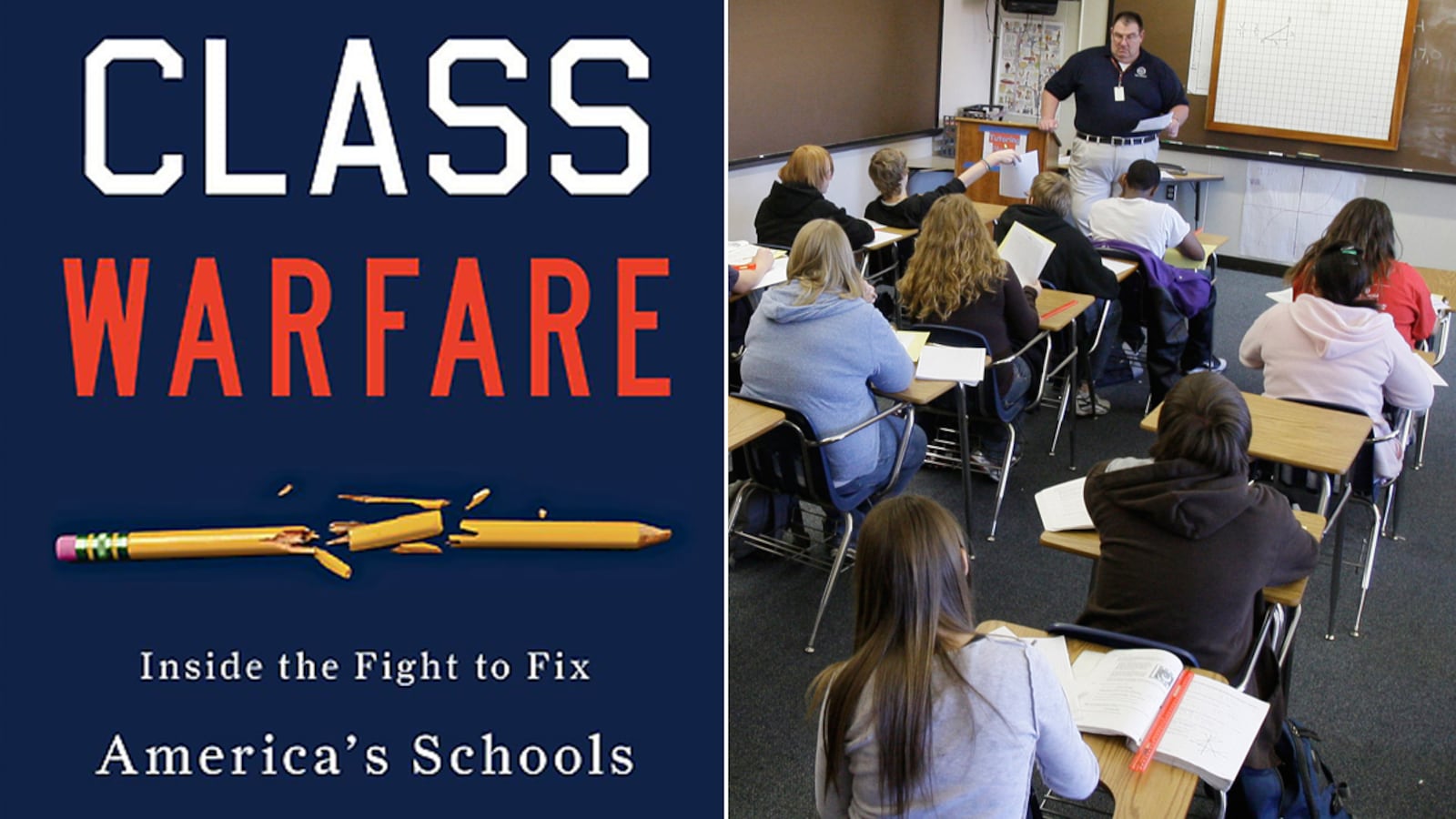Steven Brill, a journalist who founded American Lawyer magazine and Court TV, is only a recent student of the education beat. He first wrote about the field just two years ago, with a feature in The New Yorker about the New York City school system’s “rubber rooms”—spaces where teachers accused of misconduct were warehoused, doing nothing for full pay, in some cases for years. But Brill, it turns out, is a quick study. His new book, Class Warfare, is a deeply reported work on the state of the school reform movement in the United States, written in dense bursts that give color to both policy and people: the origins of President Obama’s Race to the Top program; a clandestine meeting of billionaire reformers that ends in a stranded Fifth Avenue elevator; the arc of a bright young teacher whose idealism gives way to burnout.
Mostly, though, Class Warfare reads as an argument against the teachers unions—functioning as the second half of a one-two punch, after the influential 2010 documentary Waiting for Superman, that casts the unions as the main obstacle to fixing America’s schools.
The book quotes one liberal Democrat, then former San Diego schools head Alan Bersin, explaining his evolution on teachers unions to Joel Klein, a man of similar politics who was beginning a job running New York’s schools. “It didn’t even take me ninety days,” Bersin tells Klein in Class Warfare, “before I went from being a Democrat who always thought the unions were the good guys to realizing that unions were not the good guys—that the Democratic Party and the school reform movement had run into a rock because of the transformation of the teachers’ union movement from the ’60s to the ’90s from a progressive force to the most conservative force in the mix.”
For Brill, this epiphany echoed his own changing politics. “I think that’s true, and I think that Democrats have had to come to grips with that,” he says. “A Joel Klein or an education reformer can say persuasively that public education is the civil rights issue of this era. And the reason they can now say it even more persuasively is what the success of the good charter schools prove: not that if you call something a charter school it’s automatically good, but that demography does not have to be destiny.”
The book has drawn criticism from defenders of the unions. Deborah Meier, writing at Reuters, says that for all his exhortations for better data collection, “Brill’s attack on teachers and unions, and his defense of the new ‘reformers,’ rests largely on anecdotes.” Meier adds: “We who have labored in education before Brill have long been adamant that our schools are not doing the job our society needs. It’s too bad he has little interest in the work the [school reform] ‘deniers’ have already put in as the original reformers.”

One of Class Warfare’s surprising proposals, only partly tongue-in-cheek, is that Randi Weingarten—who as president of the American Federation of Teachers leads the group that Brill sees as hostile to progress—be appointed chancellor of the New York City school system, in a kind of Nixon-in-China move.
“I got to know her really well doing this book. I actually got to like her,” Brill says. “Deep down inside, she’s more than a knee-jerk protectionist union person. I think that she knows that the merits of some of their arguments are just absurd. I think she wants to have a bigger role in life than being a union leader. If she stands up and says to teachers, ‘Listen, we are in an emergency. We’re falling behind; you can’t compete on a global stage with our public schools. I’m not going to be a tyrannical CEO, but we are going to make changes.’ I think that would have much more credibility than bringing in, you know, Jack Welch.”
Brill’s last book, After, dealt with America’s response to the Sept. 11 attacks. He also started a business, Clear, to capitalize on 9/11 travel woes, but the company went bankrupt. (Does he wish he’d invented the naked body scanner instead? “No, no,” Brill says. “And first of all, it didn’t go bankrupt when I was running it.”) Ten years along, he sees parallels to the education reform effort. “The problem with our kind of democracy is we have a very short attention span to problems,” Brill says. “With 9/11, we did a lot of things that were based on the last attack. We’re still doing that. And we’ve lost our sense of urgency that this stuff can still happen. To take it back to schools, what democracies are really bad at is dealing with long-term problems.” If a mayor like New York’s Michael Bloomberg attempted to go to war with teachers unions, that is, the gains would only be measurable five to 10 years out—while a great deal of short-term political pain would be felt in the interim.
Even so, Brill offers a prediction of where the debate on teacher tenure is headed.
“It reminds me of the old debate over whether cigarettes are dangerous to your health. It’s obvious, and it’s obvious that the tobacco companies kept that debate going on as long as they could," Brill says. "We're seeing the tail end of the unions' argument over whether the largest occupation in the U.S. should be the only occupation where no one gets promoted or paid based on how good a job they do."






